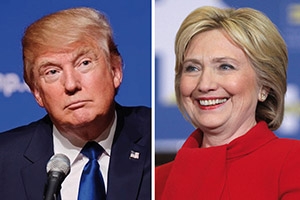Research
Presidential Predictions: No Polls, No Pundits
AU History Professor Allan Lichtman discusses presidential prediction models with professor of computer science.

An extraordinary and unprecedented election cycle has many Americans suffering from election fatigue. Just days before the nation votes, Kenton White, adjunct professor in the School of Electrical Engineering and Computer Science at the University of Ottawa and chief scientist at Advanced Symbolics, and Allan J. Lichtman, distinguished professor at American University, gave their final predictions at the event Presidential Predictions: No Polls, No Pundits. These two seasoned professors, highly regarded nationally and internationally for their accurate predictions of political elections without the use of polls, are just as split as the American public—White predicts Clinton, Lichtman predicts Trump.
Lichtman’s Qualifications on a Trump Prediction
For the first time in 30 years of using his renowned system The 13 Keys to the White House, Professor Lichtman hedged his forecast. He placed two qualifications on his prediction, an unprecedented move on his part.
The first is Key 4 (Third party): There is no significant third-party or independent campaign. Lichtman explained that this key is not completely definitive due to the candidacy of Libertarian Gary Johnson. The way The Keys work is if six or more of the 13 are false, the party in the White House loses the presidency. If less than six of the keys are false, the incumbent party maintains presidential power. The third party key has been a volatile one and a dip below 5 percent of the vote for Johnson could tilt the scales in favor of the Democrats.
The second is: Absent Key 4 switching, The Keys point to the narrow election of a “generic Republican,” said Lichtman. Trump is anything but that. Despite the recent October surprises that some pundits are predicting will negatively affect Trump, these revelations do not affect The Keys. Regarding pundit predictions, Lichtman told the audience they could “consign it to the flames.” The Keys are the world’s only historically based prediction model and thus aren’t swayed by day-to-day breaking news. Rather, they are informed by macro-issues like the strength of the economy, social unrest, and foreign/military failures and successes. Because Trump is what Lichtman calls a “history-breaking” candidate, Trump could be the presidential nominee that shatters the historical framework upon which The Keys are based.
AI Predicts Victory for Clinton
Professor White and Pauly, the name he’s given to his AI model, accurately predicted BREXIT, while other models, including polls, predicted the UK would remain in the EU. Training Pauly using BREXIT and over 100 elections, including those in Canada and Australia, as well as data from a sample of over 200,000 people, White is predicting a Clinton victory of 46.6 percent over Trump’s 41.2 percent.White illustrated how during the past year, the numbers have swayed in both directions, with his AI model affected by the public reaction to the three presidential debates and the controversial news events surrounding the candidates. Unlike The 13 Keys, the AI prediction takes into account news events specific to the candidates and analyzes public reaction to it. This, said White, is a “highly complicated series of steps.” It is “pretty basic logic for a human,” but “fascinating” for a computer to do. Barring “something amazingly out of the ordinary,” White’s AI model confidently predicts that Hillary Clinton will be the next president of the United States.
After listening to both professors give their predictions within the context of this particularly volatile election cycle, the audience was curious about the lifespan and viability of these models to predict elections now and in the future. Professor White responded that he was “fairly certain” in his Clinton prediction, though he did acknowledge that support for Johnson could affect either his or Lichtman’s prediction. Professor Lichtman pointed to the accuracy of The Keys in predicting the first African American president, Barack Obama, and The Keys supported the election of the first Catholic president, John F. Kennedy, illustrating that the model is equipped to assess candidates that history has never before seen. What he sees as particularly unique with this prediction is that Trump is “a candidate who doesn’t fall in the broad parameters of other candidates in history,” even as compared to those presidential firsts. In six days, the ballots will decide which of these professors is right.

